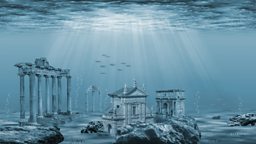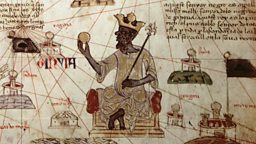Eight unbelievable theories about Atlantis - that people actually believed!
Spoiler alert: the legendary drowned island of Atlantis is a myth, invented by the Ancient Greek philosopher Plato. But that has not stopped people throughout history from searching for Atlantis, telling stories about it, and inventing theories to explain its disappearance. On Radio 4’s history podcast, You’re Dead To Me, host Greg Jenner is joined by historian Dr Stephen Kershaw and comedian Sophie Duker to learn all about the myth of Atlantis. Read on to discover the outrageous beliefs they unearthed…
1. Survivors from Atlantis ended up in America
In 1530, an Italian physician named Girolamo Fracastoro wrote an epic poem about… syphilis! In this poem, he suggested that indigenous peoples in the Americas were descendants of the people who had survived the destruction of Atlantis.

2. Atlantis is really situated in Sweden. Or maybe in Italy. Or the middle of the Atlantic Ocean
A 17th-century Swedish scholar named Olaüs Rudbeck claimed that Atlantis could actually be found in Sweden, based on a reading of Old Norse narrative poems. At around the same time, the Italian Comte Gian Rinaldo Carli tried to prove that Atlantis was the ancestor of Italy, while other people believed it could be found in the Arctic, or perhaps in the Atlantic Ocean.
3. Atlantis once controlled a huge, global empire
In 1882, American congressman Ignatius Donnelly published Atlantis: The Antediluvian World. In it, he claimed that Atlantis had been a real place, and that it once controlled an empire that encompassed Central America and Mexico, Africa, Peru, Iberia and Ireland, among other places. This allowed him to argue that the cultural achievements of non-white societies around the world can be traced to the influence of Atlantis. It should be noted that some contemporaries nicknamed Donnelly “the wild Jackass of the Prairie”!
4. The people of Atlantis were the first real humans
At the same time as Donnelly, a woman known as Madame Blavatsky wrote a book called The Secret Doctrine, in which she claimed that people from Atlantis were the first human-looking race in world history. She also claimed they were giant, had electricity, and could fly.
5. Atlanteans were actually German
In the 20th century, German archaeologist Albert Hermann claimed that the city of Atlantis was in what is now Tunisia, but that it had been a colony of Friesland and so was German. This also allowed him to argue that Germans were an ancient and highly civilised people that pre-dated other European cultures.

6. Atlantis was an Aryan civilisation
This is where the Atlantis myth gets darker. Many Nazis, including Heinrich Himmler, promoted research into Atlantis alongside research into the Aryan race. The head of his Ahnenerbe (Institute of Ancestral Heritage) was a man named Herman Wirth, who believed that Atlantis was a lost Nordic empire that lay in the North Atlantic. This research was part of a Nazi project that aimed to prove Aryan and Germanic supremacy, through supposed links to ancient civilizations like Atlantis.
7. Atlantis was powered by crystal energy
In the 1960s, a book was published full of stories about Atlantis. These came from the psychic, or “prophet”, Edgar Cayce, who claimed to go into trances where he could access his and other people’s past lives, especially the lives they lived in Atlantis. In his version, Atlantis was a highly scientifically-advanced civilisation that ran on energy from crystals!
8. The city was destroyed by a huge volcano
The idea that the island of Santorini (or Thera) is the real Atlantis gained popularity in the 1960s. Excavations revealed that a society similar to the nearby Minoan civilization on Crete had been buried by a cataclysmic volcanic eruption in around 1500BCE. Seems like a sensible theory, right? Sadly, the idea that Thera is Atlantis – or even that its destruction inspired Plato's story – has been seriously questioned by experts. It turns out that Atlantis really is just a myth.
Want to dive further? Listen to the Atlantis episode




































